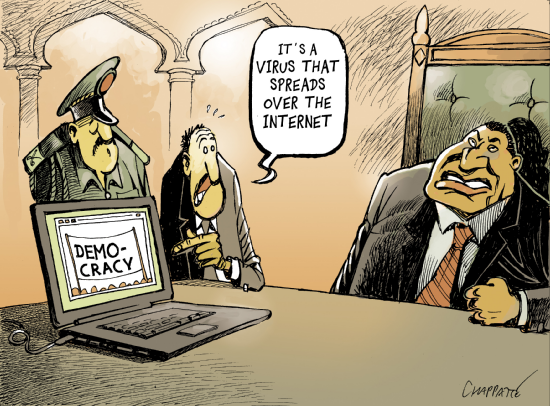A New Hope for Democracy

I’m taking a stand. Technology (and by that I mean NEW technology) has the potential to increase the prevalence and quality of democracy around the world. In my opinion, there are 3 ways that this can be accomplished: dissemination of information, growth of a global culture, and increased opportunities for participation. I am mostly referring to the internet when I speak of new technology.
Dissemination of Information
Churchill one said, “the best argument against democracy is a five minute conversation with the average voter.” Indeed this is a major democratic flaw, the tendency for people to be uninformed. Misinformation is also a huge factor which impedes the proper exercise of democracy. The television and radio mass media is owned by a small handful of companies and, as Noam Chomsky would argue, they are able to manipulate the agenda for their own interests. The internet gives people the opportunity to consult a nearly infinite variety of sources and viewpoints. The fully informed voter is more likely to be someone who reads news and forms opinions based off the multiplicity of interpretations the internet provides. This would have been next to impossible 50 years ago, now it is instant.
Growth of a Global Culture
The internet is probably the most unifying innovation since satellite television. If a global culture does exist, its home is online. Increasingly, this global culture is based off of the cultural group which dominates the internet, namely western cultures. These espouse liberal views of equality, individualism, and ultimately democracy. It is no wonder that the most undemocratic countries in the world severely limit or censor internet access. Instant connections to a cultural community online which is devoted to grassroots individualism will foster democratic values in people who otherwise would have had no contact with other ideas.
Increased Opportunities for Participation
Many people credit social networking sites like Facebook and Twitter for mobilizing the population and making the democratic revolutions of the Arab Spring possible. Indeed it is a tremendous tool for mobilizing civil society, and forming large groups which can then have their voice heard by government. I previously introduced the website voteocracy on this blog. It basically lets people cast votes for every bill entering congress, thereby instantly aggregating a measure of public approval which legislators can look at. Services such as this can make the link between the pulse of the people and the lawmakers much more solid, which is the entire point of democracy in the first place.
All in all, the internet serves to make everyone more connected. The point of democracy is to connect people to their representatives, and thereby indirectly create policies which the people would have wanted. The point of the internet is…… well its not democracy per se, but it can definitely fulfill this purpose.